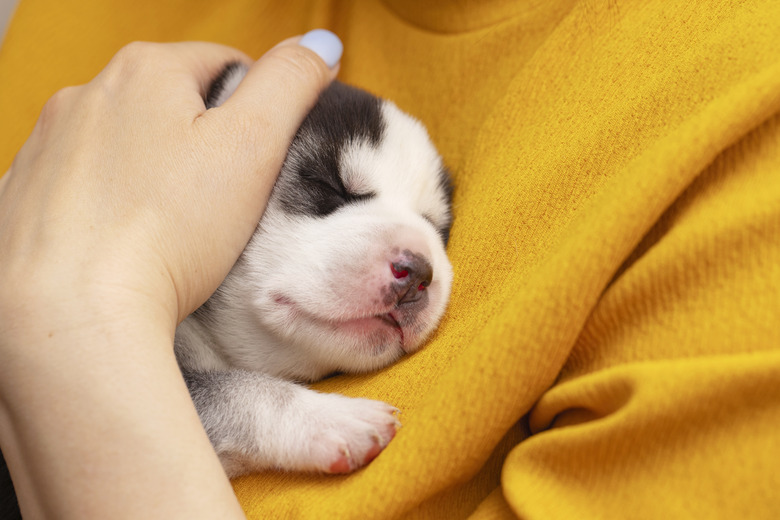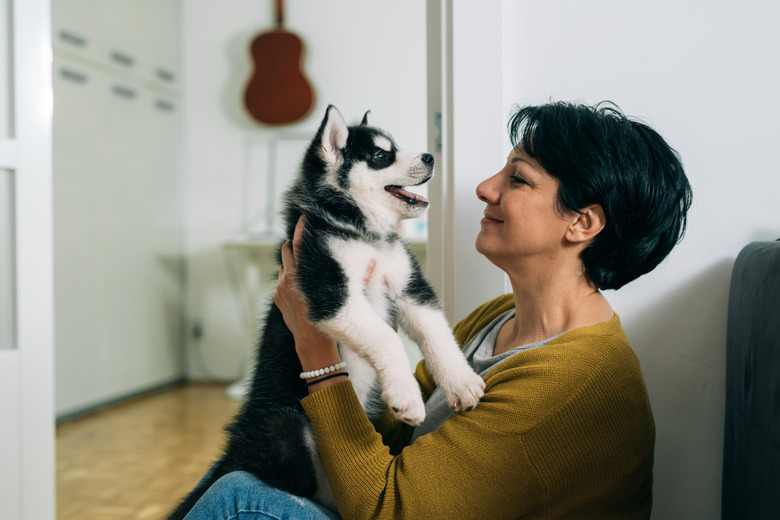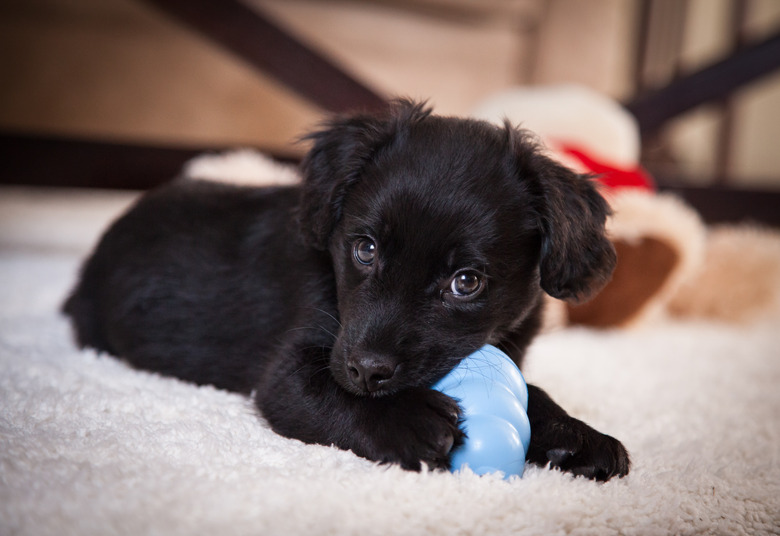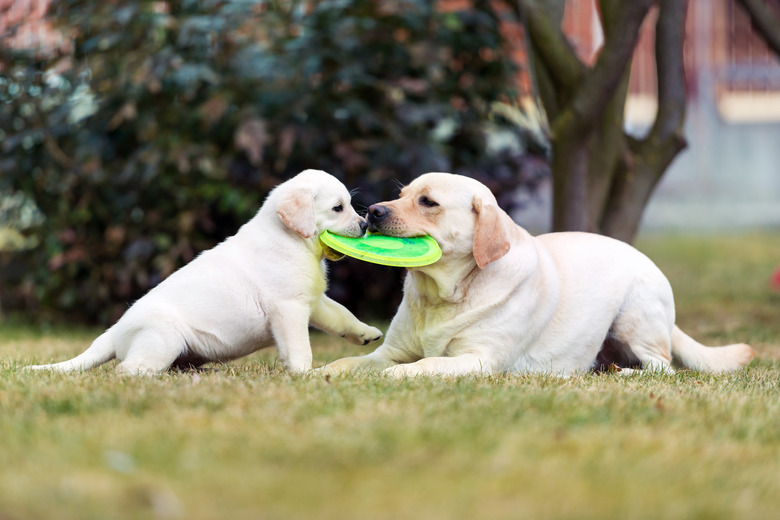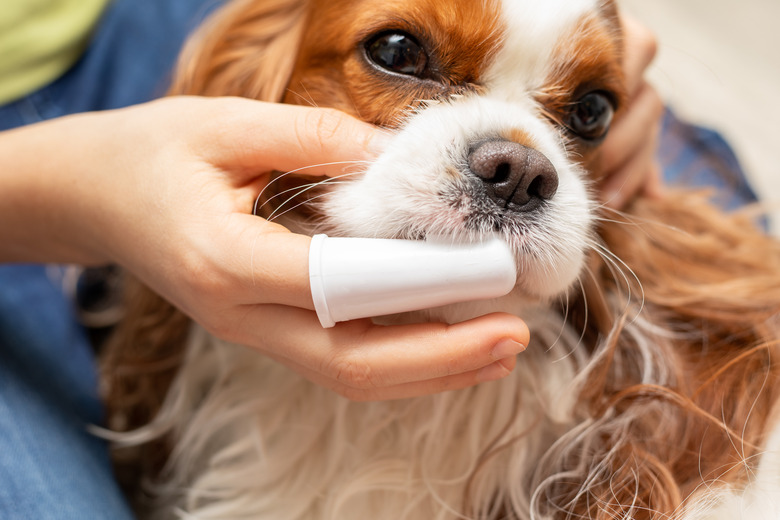The Complete Guide To Puppy Teething
Puppies are not born with any teeth. But during their first few weeks of life, they grow their first set of baby teeth. These teeth are sometimes referred to as milk teeth. Later on, they are pushed out by permanent teeth as the puppies get older. The process of new teeth coming in is known as teething. It is a painful and uncomfortable part of growing up for puppies. Knowing what to expect can help you to support your puppy through this stage of development.
How many teeth do puppies have?
How many teeth do puppies have?
Puppies will have different numbers of teeth at different stages of life. Puppies get 28 baby teeth known as deciduous teeth that come in when they are young puppies. As they get a little older, puppies will get their 48 permanent adult teeth.
Puppy teething timeline
Puppy teething timeline
During the first few months of their life puppies will have two sets of teeth. Every dog has an individual teething process. But in general, the following is a breakdown of the ages at which puppies begin the various teething stages.
From birth to 6 weeks a puppy does not have any teeth. They are born without them. However, their deciduous teeth (or puppy teeth) start coming in between the ages of 3 to 6 weeks. They begin to get their canine and incisor teeth first. Their premolars will come next. Around this time, a breeder will begin to wean the puppies from their mother's milk. The puppies will start eating soft but solid dog food — they will now have gained the teeth to chew it. The puppies are starting to explore the world with their mouths. This behavior is accompanied by gnawing and nipping.
Between 12 weeks to six months, the puppies will begin losing their baby teeth. These deciduous teeth will fall out naturally while puppies are chewing, eating, and playing. There can also be breed differences for when a puppy's baby teeth will fall out. Just like kids, puppies are individuals and will lose their teeth at different ages within this period of time. In general, puppies will have lost all their baby teeth and have their adult permanent teeth in place after six months of age. Even giant breed dogs who physically develop slower than smaller breed dogs will generally finish teething between 12 weeks and 6 months. During this time, your puppy is going to be regularly teething as their adult teeth are coming in. Their milk teeth are falling out.
Between 6 months to 12 months, your puppy will still be growing and maturing during this time but their adult teeth will now be in place. By this point, it's important to have a dental care routine in place for your dog. Make sure that your puppy's teeth are kept clean and in good condition. These are the teeth your puppy will have for the rest of their life.
Puppy teething symptoms and behaviors
Puppy teething symptoms and behaviors
- Biting and nipping. These are
common puppy behaviors because they are using their mouth to explore the world
around them. For teething puppies, this behavior often becomes intensified. - Increased irritability. Teething can make puppies irritable and uncomfortable.
- Seeking relief. Puppies will often engage in behaviors to provide themselves with relief from their sore mouth and gums. This
can include increased drooling, chewing, mouthing, and biting of people
and objects around the house.
Teething toys for puppies
Teething toys for puppies
Teething is painful and uncomfortable for puppies. Therefore it's important to provide your puppy with safe and appropriate things to chew on. Chewing is one of the primary ways a puppy can alleviate their discomfort. Safe chew toys for teething puppies include durable rubber toys like Kongs. These can be stuffed with peanut butter or wet dog food — to encourage puppies to chew on them.
You can also get teething-specific toys and chews that are designed to help massage a puppy's sore gums as they chew. By giving your puppy lots of opportunities to chew, you can help prevent them from chewing things around your home. This can also help keep your puppy from biting you.
It is also not uncommon to find a small amount of blood due to an increase in chewing. This is not a cause for concern unless you see (in a very rare instance) a lot of blood — in which case, contact a veterinarian.
You might find lost puppy teeth around your home
You might also be lucky and find a baby tooth around the house, and in your puppy's toys. These teeth can be discarded or saved as a unique keepsake. If you don't find any puppy teeth don't panic. Many puppies swallow their teeth as they fall out without dog owners realizing they ever lost a tooth in the first place. As part of teething and puppy teeth falling out it is not uncommon to see small amounts of blood on your puppy's toys and chews.
When a puppy's adult teeth take too long to descend
When a puppy's adult teeth take too long to descend
On rare occasions, a puppy may have some milk teeth that don't fall out as anticipated. Persistent deciduous teeth refer to a puppy tooth being in a puppy's mouth as a permanent tooth grows in. This can interfere with your dog's bite and make it difficult for your puppy to eat, bite and play normally.
There are certain situations in which you should contact your puppy's veterinarian for a visit:
- Your puppy has not lost their teeth by ages of 6 to 7 months
- Their adult teeth are growing around the puppy teeth
- Your dog seems sick or has a fever
- You notice anything else abnormal about how your puppy's teeth are growing in
If both the milk and adult teeth are allowed to remain in a puppy's mouth, it can also lead to a buildup of plaque and tartar. If this occurs, your puppy's veterinarian will likely extract the puppy tooth to make room for the adult tooth to come in properly.
Certain breeds struggle more with teething than others
Brachycephalic breeds (breeds with flat skulls) most commonly struggle with retained deciduous teeth. Common breeds that struggle with this teething issue include:
- Boston Terriers
- boxers
- bulldogs
- French Bulldogs
- Pekingese
- pugs
Create a puppy toothbrushing routine
Create a puppy toothbrushing routine
It's important to introduce your puppy to the experience and sensation of getting their teeth brushed early. As soon as you bring your new puppy home, start to incorporate a tooth-brushing routine into their day. Toothbrushing can help prevent the buildup of tartar and keep your dog's teeth clean and healthy. Although your new puppy is going to lose their baby teeth, the teeth that replace them will be with your dog for the rest of their life.
All dogs benefit from regular tooth brushing. Some dog breeds are more prone to dental disease than others. Ask your veterinarian about any questions or concerns you may have regarding your puppy's breed and their dental health.
When brushing your dog's teeth, you should always use special dog toothbrushes and toothpaste. Dog toothpaste is safe for dogs. It is also usually peanut butter flavored or other flavors of interest to dogs. Introduce your puppy to teeth brushing consistently and over time — so they become used to the sensation.
Some dog breeds are more prone to having dental issues
All dogs benefit from regular teeth brushing and having professional teeth cleaning by their veterinarian as needed. A recent study found that smaller breeds of dogs frequently experience more dental issues in their lifetime than larger dogs.
Similarly, brachycephalic breeds (flat-faced dogs) also have an increased risk of dental disease and have a 1.25 times greater risk of dental disease when directly compared with dogs with medium-length skulls. A recent study found that 1 in 8 eight dogs experiences dental disease.
This same study found that the following smaller dog breeds have an increased risk of dental disease:
- Cavalier King Charles Spaniels
- dachshunds
- chihuahuas (face the most dental disease and it is their top health problem)
- pugs
- toy poodles
The bottom line
The bottom line
Just like human babies, puppies go through two sets of teeth as they develop. At a couple of weeks old, puppies get their baby teeth or milk teeth. Before puppies are six months old, they usually lose them during the teething process and their permanent adult teeth come in. While teething, a puppy may bite, nip, or drool more than usual. This is because they are trying to relieve their mouth discomfort. They may also appear more irritable and agitated to pet parents. To help your puppy through teething pain, provide them with teething toys and safe chews. These can help alleviate the pain of teething and provide distraction. Be sure to clean your puppy's teeth at each stage consistently — especially their permanent adult teeth. Consult your puppy's veterinarian with any questions regarding their dental care at any stage of the teething process and beyond.
References
- Nutritional Requirements of Large and Giant Breed Puppies
- New RVC research gets to the root of dental disease in dogs
- Smaller dog breeds more likely to suffer dental disease
- British Veterinary Association: Smaller dog breeds more likely to suffer dental disease
- VCA Animal Hospitals: Persistent Deciduous Teeth (Baby Teeth) in Dogs
- Purina Pro Club: Periodontal Disease Is the No. 1 Health Problem in Chihuahuas

